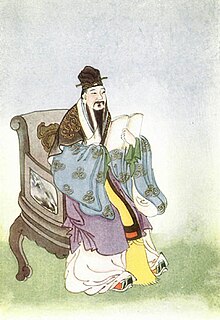Mencius
Mencius (Cheenese: 孟子; pinyin: Mèng Zǐ; Wade–Giles: Meng4 Tzu3; Zhuyin Fuhao: ㄇㄥˋ ㄗˇ; maist acceptit dates: 372 – 289 BCE; ither possible dates: 385 – 303/302 BCE) wis a Chinese philosopher that is the maist weel kent Confucian efter Confucius hissel.[5]
 Mencius, frae Myths and Legends of China, 1922 bi E. T. C. Werner | |
| Born | 372 BCE |
| Dee'd | 289 BCE (aged 83) |
| Era | Ancient philosophy |
| Region | Chinese philosophy |
| Schuil | Confucianism |
Main interests | Ethics, Social philosophy, Poleetical philosophy |
Notable ideas | Confucianism |
Influences
| |
Influenced
| |
| Auncestral name (姓): | Ji (Cheenese: 姬; Pinyin: Jī) |
| Clan name (氏): | Meng (Ch: 孟; Py: Mèng)[1] |
| Given name (名): | Ke (Ch: 軻; Py: Kē) |
| Courtesy name (字): | Unkent[2] |
| Posthumous name (謚): | Master Meng the Seicont Sage[3] (Ch: 亞聖孟子; Py: Yàshèng Mèngzǐ) |
| Styled: | Master Meng[4] (Ch: 孟子; Py: Mèngzǐ) |
References
eedit- ↑ The original clan name was Mengsun (孟孫), and was shortened into Meng (孟). It is unknown whether this occurred before or after Mencius's death.
- ↑ Traditionally, his courtesy name wis thocht tae be Ziche (子車), sometimes incorrectly written as Ziyu (子輿) or Ziju (子居), but recent scholarly warks shaw that these courtesy names appeared in the 3rd century CE and apply tae a different historical figure cried Meng Ke that lived in Chinese antiquity as weel an wis mistaen for Mencius.
- ↑ That is, the second sage after Confucius. Name given in 1530 by Emperor Jiajing. In the two centuries before 1530, the posthumous name was "The Second Sage Duke of Zou" (鄒國亞聖公) which is still the name that can be seen carved in the Mencius ancestral temple in Zoucheng.
- ↑ Romanized as Mencius.
- ↑ Shun, Kwong Loi. "Mencius". The Stanford Encyclopedia of Philosophy. Retrieved 19 September 2012.